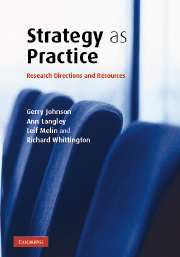Preface
Published online by Cambridge University Press: 10 March 2010
Summary
There has always been an interest by some strategy scholars in the activities of managers as they relate to the development of strategy. Henry Mintzberg's work in the 1970s and the case study work of Andrew Pettigrew and some of the authors of this book in the 1980s show this. It is an interest that has continued. For example Andrew Pettigrew and Georg von Krogh co-ordinated EGOS workshops in 1999, 2001 and 2002 on Acting and Thinking Strategically that attracted scholars with a bias towards researching such activities. It was from these EGOS workshops that several strands of research started to converge; these are discussed more fully in chapter 1.
One workshop was concerned with what strategists actually do – with strategizing. The second examined the gap highlighted by resource-based theorists: the need to understand the activities that underpin the distinctive competences bestowing competitive advantage on organizations. The third looked at the continuing interest in processes of strategy development in organizations. Given that all three of these interests placed an emphasis on the activities of people in organizations, it was decided to find out just how much interest and research was going on in the field by promoting a special issue of the Journal of Management Studies and inviting papers on these topics. The initiative actually started with a ‘research conversation’ on the themes at an EIASM conference in 2001 where over fifty academics representing these three strands met to present their research and arguments. Many of the papers developed from this event found their way into the Journal of Management Studies Special Issue (Johnson, Melin and Whittington 2003) and, since then, Strategy as Practice has ‘taken off’.
- Type
- Chapter
- Information
- Strategy as PracticeResearch Directions and Resources, pp. ix - xPublisher: Cambridge University PressPrint publication year: 2007

